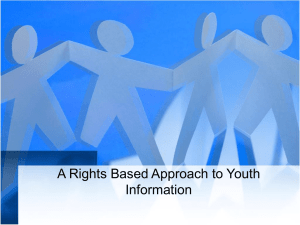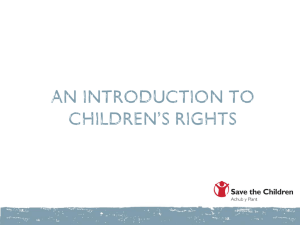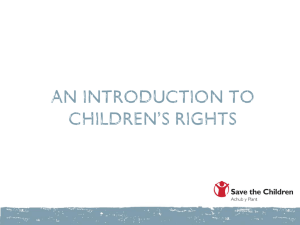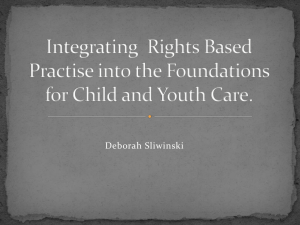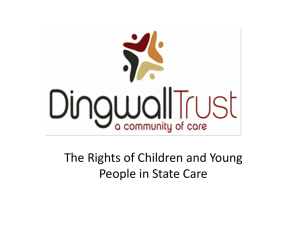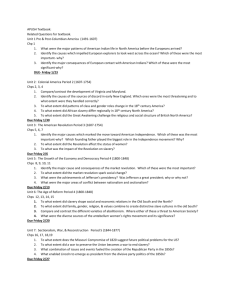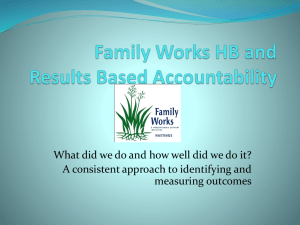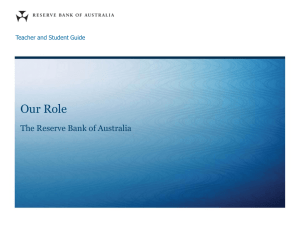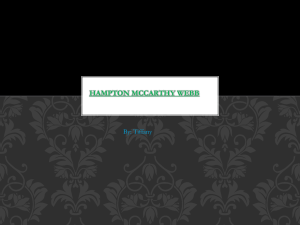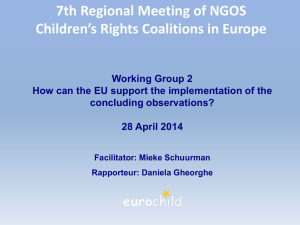Awareness of the United Nations Convention for Rights of the Child
advertisement
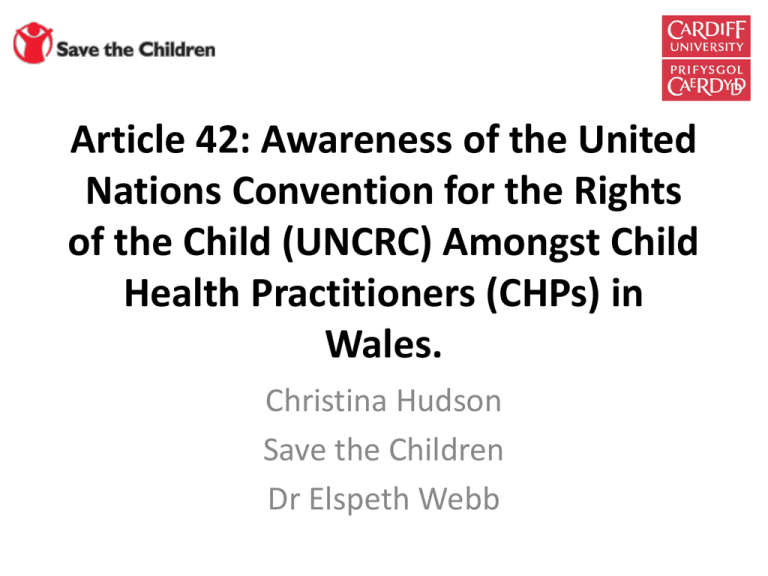
Article 42: Awareness of the United Nations Convention for the Rights of the Child (UNCRC) Amongst Child Health Practitioners (CHPs) in Wales. Christina Hudson Save the Children Dr Elspeth Webb Good Examples. • Promoting awareness. Children’s Rights Week Children’s Hospital, Wales. • Professional training. Cardiff two Part 8 reviews into child maltreatment deaths led to local development of rights-led child protection training materials. • Using the UNCRC as an auditing tool. • Using the UNCRC to improve the public health of children. Training. • Undergraduate lecture before Child Health block in Year 4. – Incorporate rights ‘into their core professional values’ (Webb et al, 2009) • Postgraduate – Becoming ‘increasingly core’ component of speciality training programme thanks to RCPCH (Reading et al, 2008). Models in Healthcare. • Biomedical Model – focuses on physical processes. Paternalistic, “doctor knows best”. • Bio-Psycho-Social Model – all have a role in the context of disease or illness. • Patient-centred. Rights-Based Approach. • Using the UNCRC as a guide for how CHPs deliver and structure services. • The four core principles: non-discrimination; devotion to the best interests of the child; the right to life, survival and development; and respect for the views of the child. RBA Continued... Act in the child’s best interest. Life and good health. Privacy and confidentiality. Respect and dignity. Education and play. Information. Protection from harm. Participate – Consent. Project. • Interviewing CHPs throughout Wales, questioning: – What they know about the UNCRC, – What teaching they have received on the UNCRC, – If and how they implement this in practise, – To find out about how CHPs could be made more aware of the UNCRC, and – How a rights-based approach (RBA) might affect clinical practise and child well-being. Method. • Qualitative, semistructured interviews. • Approached 20 CHPs across Wales LHBs. • Recruited 9 CHPs, verbally consented. • Transcribed, thematic analysis. Results. Teaching for Current CHPs: • 6/9 never received formal teaching on UNCRC. • 100% had noticed UNCRC mentioned in other teaching. • Ideas for teaching their cohort of CHPs. – Constant assessment. – Using WPS. Future Teaching Directions for Potential CHPs: • 100% wanted continual exposure to UNCRC, with an introduction at undergraduate level. • Format – seminars, taught by example. • Challenges – “training the trainer”, attitudes, curriculum space. Results. MDT and Outside Agencies: RBA to Child Health: • 6/9 UNCRC delivered to MDT in Child Health. • Others: GPs, A&E. • Outside agencies: • 7/9 though RBA was valid. • “encompasses a holistic approach”. • 8/9 improve quality of healthcare. • 4/9 currently RBA. • 6/9 raising awareness and teaching on UNCRC increase uptake of RBA. – School nurses, education, policy and managerial positions. Results. Policy: • 5/9 would like to see RBA applied at policy level: – “more important” • 5/9 using WHP to make UNCRC compulsory at UG was a good idea. – “heavy-handed”. • Under-funded and politically underrepresented in the WAG. Implications. • Unanimous view – CHPs in Wales want continual exposure to UNCRC training. – Training the trainers, how to deliver training. • 8/9 thought a RBA could improve the quality of care children receive. • Children’s Right Measure, put policy into practise. – Guidelines written by WAG & RCPCH, delivering training. Critique. • Limited by time constraints placed on the project. • Future directions: – Using a more random recruitment method. – Recruiting CHPs from other trusts. – Recruiting more Paediatric Surgeons. – Expanding to A & E and GP staff. Conclusion. “People know to wear a seatbelt. People occasionally put a seatbelt on because a policeman will be watching, but for the most it’s natural, and they’d feel unsafe if they didn’t. That’s where this needs to be. Constant. And then we would have succeeded. If you want a RBA then we have a way to go.” – CHP interviewee. References. • Coyne, I; “Children's participation in consultations and decisionmaking at health service level: A review of the literature.” International Journal of Nursing Studies. Vol. 45, Issue. 11, Pages 1682-1689. 2008. • Goldhagen. J; “Intergrating Paediatrics and Public Health”. Paediatrics. Vol. 115, No. 4. Pages 1202-1208. 2005. • Horsmann. C; “The particular needs of children and adolescents – not just little adults”. The Foundation Years. Vol. 5, Issue. 2, Pages 75-78. 2009. • Leygue. C, Maio. G, Gebauer. J, Karremans. J, Webb. E; “Prejudice Against Children”. In press. • Mulley. C; “The Woman Who Saved the Children”. Oneworld Oxford. 2009. References. • Perera. A; “Can I Decide Please? The State of Children’s Consent in the UK”. European Journal of Health Law. Vol. 15, No. 4, Pages 411-420. 2008. • Reading. R, Bissell. S, Goldhagen. J, Harwin. J, Masson. J, Moynihan. S, Parton. N, Santos Pais. M, Thoburn. J, Webb. E; “Promotion of children’s rights and prevention of child maltreatment”. Child Maltreatment 4. 2008. • Rees. C; “An Introduction to Research for Midwives”. Second Edition. Books for Midwives. 2003. • Save the Children; “Stop, Look, Listen, the road to realising children’s rights in Wales”. 2007. • Webb. E.; “An Exploration of the Discrimination-Rights Dynamic in Relation to Children”. In press. • Webb. E, Horrocks. L, Crowley. A and Lessof. N.; “Using the UN Convention on the Rights of Children to Improve the Health of Children”. Paediatrics and Child Health. Vol. 9, Issue 9, Pages 430-434. 2009.
